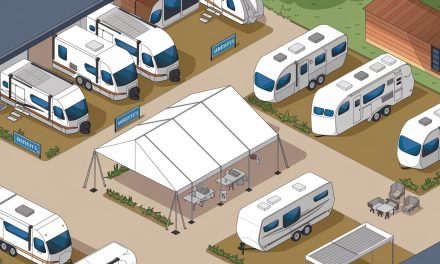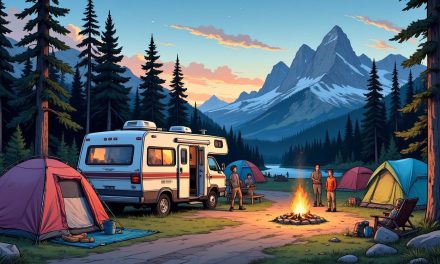The RV industry is buzzing with excitement about a new wave of buyers, but what they’re not telling you might save your financial future. According to the latest RVIA report, 16.9 million Americans are planning to buy an RV in the next five years, with a whopping 73% of these “intenders” being under 55 years old.
While glossy commercials show families laughing around campfires and couples gazing at mountain sunsets, the reality behind those $98-a-month promises tells a very different story. RV industry expert Alan Warren, known as “The RV Wingman,” recently exposed the dark underbelly of this booming market in a brutally honest analysis that every potential buyer needs to hear.
You’re about to discover why seasoned RV professionals are worried about this trend — and why understanding these seven shocking truths could prevent you from becoming another “one-and-done” statistic. From predatory sales tactics to hidden costs that can double your monthly payment, the dream of RV freedom might just become your financial nightmare.
Would you like to save this article?
1. The “Nostalgic Nurturers” Are Driving 60% of RV Interest — But Memory Lane Has Potholes
The Reality Check You Need
The largest segment of potential RV buyers (60%) are what industry experts call “nostalgic nurturers” — people trying to recreate magical childhood camping memories. The RVIA report reveals that these buyers are chasing experiences from their youth when camping seemed effortless and carefree.
Here’s the wake-up call: Your parents handled all the stress, maintenance, and financial burden while you just enjoyed s’mores and stargazing. That “magical” experience came with a hidden cost that eight-year-old you never saw.
| Childhood Memory | Adult Reality |
|---|---|
| Dad effortlessly set up camp | $200-400 monthly maintenance reserves needed |
| Everything just worked | 30-35% of first-time owners sell within 5 years |
| Pure fun and adventure | $5,000+ emergency fund required for major repairs |
Supporting Facts:
- The median age of first-time RV buyers has dropped to 32 years old as of 2022
- 31% of current RV owners are first-time buyers, showing the industry’s heavy reliance on new customers
- Studies show experienced full-timers recommend $200-400 monthly maintenance budgets — that’s on top of your loan payment
2. Your $98 Monthly Payment Is Actually a Financial Trap in Disguise
The Commission Game Exposed
You’re not buying an RV for $98 a month — you’re being lured into a commission goldmine for salespeople who make zero profit on the actual RV sale. Industry insider Alan Warren reveals the shocking truth: dealers don’t make money selling those cheap starter RVs.
The real profit comes from the add-ons they’ll pressure you to buy: fabric protection, paint protection, tire warranties, and extended service plans. Your salesperson literally doesn’t earn a commission unless you buy these extras.
This explains why they’re so pushy about “optional” items you supposedly “need.” You’ll walk out paying double that advertised monthly payment, locked into a 15-year loan for an RV that won’t last seven years.
| What You See | What You Actually Pay |
|---|---|
| $98/month advertised | Often doubles with add-ons |
| “Optional” protection plans | Where salespeople make their commission |
| 15-year financing | For RVs lasting 7-8 years maximum |
Supporting Statistics:
- 84% of new RV buyers in 2022 were Millennials and Gen Xers, making them prime targets for these tactics
- Industry data shows that financing is where dealerships make ongoing revenue through payment processing
- The average RV loan term has stretched to 15+ years, creating massive depreciation problems
3. The “Emerging Market” Exists Because Everyone Else Is Financially Buried
Why the Industry Desperately Needs Fresh Victims
The RV industry is aggressively targeting young buyers because they’ve financially destroyed their existing customer base. Seasoned RV professionals report hearing “stories every single week” of people who are $20,000, $30,000, even $50,000+ upside down on their RV loans.
When money was cheap during COVID, dealers convinced buyers to take on massive debt for toys they’d barely use. Now that interest rates have risen and lending requirements have tightened, those buried customers can’t afford another RV even if they wanted one.
You’re the fresh blood the industry needs to survive — but only if you don’t know what happened to the last generation of “intenders.”
| Previous Buyers’ Fate | Current Impact |
|---|---|
| $50,000+ underwater on loans | Can’t buy again for years |
| One-and-done experiences | Lost customers forever |
| Financial stress from ownership | Negative word-of-mouth |
Market Reality:
- The RV industry is experiencing declining sales in mature demographics
- 16.9 million “intenders” identified — showing desperate need for new customers
- 46% of current owners are aged 35-54, indicating the sweet spot for targeting
4. Urban Millennials Are Prime Targets — And Prime Victims
The City Dweller’s RV Nightmare
34% of these new “intenders” live in urban areas, making them perfect targets for RV marketing but terrible candidates for RV ownership. If you live in the city, where exactly are you planning to store that 30-foot trailer?
Storage costs alone can add $100-300+ monthly to your RV budget — something those glossy ads conveniently forget to mention. Plus, urban dwellers typically have less mechanical experience, making them more vulnerable to maintenance surprises.
The industry knows urban buyers are more likely to impulse purchase based on social media inspiration rather than practical planning. You see your friend’s Instagram post from Yellowstone and think, “We should get an RV!” without considering the logistics nightmare ahead.
| Urban Challenge | Hidden Costs |
|---|---|
| Storage facilities | $100-300+ monthly |
| Limited parking options | Potential fines/violations |
| Maintenance access | Higher repair costs |
| Towing experience | Learning curve accidents |
Demographics Driving This Trend:
- 32% of intenders identify as multicultural (African-American, Asian-American, Hispanic, or LGBTQ+)
- 48% are parents of young children seeking family adventure
- Median age of RV owners dropped from 53 to 49 in just four years
5. Social Media Is Creating a Generation of Financially Reckless “Flickering Families”
Instagram vs. Reality
The industry has identified “flickering families” — people who make RV purchases based on social media inspiration. You scroll through Instagram, see friends having amazing adventures, and think “We need that life!” without understanding the full picture.
What you don’t see in those perfect posts: the breakdown on the side of the highway, the $3,000 repair bill, the arguments over setup and teardown, or the credit card debt from unexpected expenses.
Social media creates “FOMO” (fear of missing out) that overrides practical financial planning. You’re making a 15-year financial commitment based on someone else’s highlight reel.
| Social Media Shows | Reality Involves |
|---|---|
| Perfect sunset photos | Hours of setup/teardown |
| Happy family moments | Maintenance stress |
| Adventure and freedom | Unexpected repair costs |
| Easy lifestyle | Storage and logistics challenges |
The Psychology Behind It:
- Millennials (40%) are most likely to purchase an RV in the next year
- Gen Z (45%) leads online RV travel information searches
- Social media influence drives impulsive rather than educated purchasing decisions
6. Maintenance Reality Will Shock Your Monthly Budget
The Expenses They Don’t Advertise
Your RV payment is just the beginning of your financial commitment. Industry experts recommend setting aside $200-400 monthly for maintenance alone, with a $5,000+ emergency fund for major repairs. That’s potentially $800+ monthly on top of your loan payment.
RVs are complex machines combining automotive, electrical, plumbing, and HVAC systems — all subject to the vibration and stress of road travel. Unlike your house, your RV moves, shakes, and experiences extreme temperature changes that accelerate wear and tear.
First-time owners are shocked when they discover routine maintenance costs more than their car payments. Air conditioner repair: $1,200. Slide-out motor replacement: $2,800. Roof membrane replacement: $4,500.
| System | Typical Repair Costs |
|---|---|
| Air conditioning | $800-1,500 |
| Slide-out mechanisms | $1,500-3,000 |
| Electrical systems | $500-2,000 |
| Plumbing repairs | $300-1,200 |
| Roof work | $2,000-5,000 |
Maintenance Statistics:
- One real owner’s 5-year analysis: $23,557 purchase + $3,407 maintenance + $5,890 carrying costs
- Over 45 months, another owner spent $17,981 in repairs and maintenance alone
- 30-35% of RV owners upgrade or sell within five years due to maintenance overwhelm
7. You’re Signing Up for a Depreciating Asset with Appreciating Problems
The Long-Term Financial Reality
You’re taking a 15-year loan on something that depreciates faster than a luxury car while requiring more maintenance than a century-old house. By year seven, your RV might be worth 30% of what you paid, but you’ll still owe 60% of the original loan.
The industry pushes long-term financing because it makes monthly payments seem affordable — but you’ll be paying for something that’s literally falling apart around you. Most RVs aren’t designed to last 15 years of regular use.
Meanwhile, maintenance costs increase as the RV ages, creating a perfect storm of declining value and rising expenses. You’re not building equity — you’re funding your own financial destruction.
| Year | Typical Value | Remaining Loan | Maintenance |
|---|---|---|---|
| 1 | 85% original price | 95% original loan | Low |
| 5 | 60% original price | 75% original loan | Moderate |
| 10 | 35% original price | 45% original loan | High |
| 15 | 20% original price | 0% original loan | Very High |
The Brutal Math:
- RVs can depreciate 20% in the first year alone
- Most financing stretches 12-20 years for affordability
- Maintenance costs typically increase 15-25% annually after year 3
Conclusion: Your RV Dreams Need a Reality Check
The RV industry’s targeting of young, diverse, urban buyers isn’t about inclusivity — it’s about financial survival. With 16.9 million “intenders” in their crosshairs, dealers are counting on your nostalgia, social media inspiration, and financial inexperience to keep their commission checks coming.
Before you sign that loan paperwork, ask yourself: Are you prepared for $400+ monthly maintenance costs? Can you handle being $30,000 underwater on a depreciating asset? Do you have realistic expectations about RV ownership, or are you chasing an Instagram fantasy?
The smart money says rent before you buy, educate yourself thoroughly, and never trust a salesperson who pushes add-ons harder than they discuss real ownership costs. Your future financial freedom depends on seeing through the industry’s “happy talk” and making decisions based on facts, not feelings.
Remember: RVs can provide amazing experiences — but only if you go into ownership with eyes wide open and wallet properly protected.
SOURCES
- RVIA New Study Reveals Emerging RV Buyers
- Go RVing RV Owner Demographic Profile – RVIA
- RV Ownership Statistics 2025 – ConsumerAffairs
- The Real Cost of RV Ownership – 5-Year Analysis
- Hidden Costs of RV Living: 25+ Real Expenses
- How Long Does the Average RV Owner Keep Their RV
- The Real Cost of RV Ownership – RV Love
- The New RV buyers: Millennials and Gen Zers – Aqua Finance
- Original YouTube Video: THE RVIA REPORT EXPOSED







